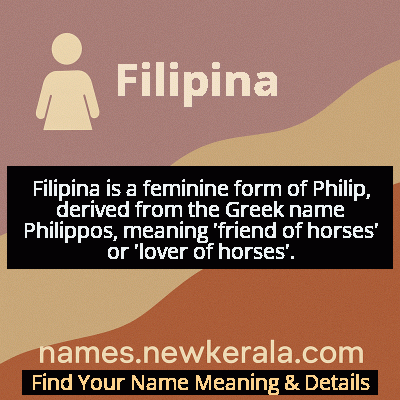Filipina Name Meaning & Details
Origin, Popularity, Numerology Analysis & Name Meaning of Filipina
Discover the origin, meaning, and cultural significance of the name FILIPINA. Delve into its historical roots and explore the lasting impact it has had on communities and traditions.
Name
Filipina
Gender
Female
Origin
Greek
Lucky Number
4
Meaning of the Name - Filipina
Filipina is a feminine form of Philip, derived from the Greek name Philippos, meaning 'friend of horses' or 'lover of horses'.
Filipina - Complete Numerology Analysis
Your Numerology Number
Based on Pythagorean Numerology System
Ruling Planet
Uranus (Rahu)
Positive Nature
Strong sense of order, loyal, practical, and disciplined.
Negative Traits
Stubborn, overly serious, rigid, and prone to feeling restricted.
Lucky Colours
Blue, gray.
Lucky Days
Saturday.
Lucky Stones
Blue sapphire.
Harmony Numbers
1, 7, 8.
Best Suited Professions
Managers, engineers, accountants, organizers.
What People Like About You
Dependability, discipline, practicality.
Famous People Named Filipina
Filipina Kitsos
Greek poet
Renowned for her lyrical poetry exploring themes of nature and feminine identity
Filipina de Silva
Historical figure
Portuguese noblewoman known for her patronage of arts and education during the Renaissance
Filipina Chandler
Equestrian
Olympic dressage competitor and founder of therapeutic riding programs for disabled children
Filipina Apostolou
Academic
Professor of Classical Studies and author of groundbreaking research on ancient Greek equestrian culture
Name Variations & International Equivalents
Click on blue names to explore their detailed meanings. Gray names with will be available soon.
Cultural & Historical Significance
The name spread throughout Europe during the Crusades and Renaissance, often adopted by royal and noble families who valued its classical origins and aristocratic connotations. In the Philippines, the name took on additional significance during Spanish colonization, though it's important to note the distinction between the personal name Filipina and the demonym for Philippine women. Throughout history, the name has been associated with educated, cultured women who often broke gender barriers in their respective societies. In modern times, Filipina maintains its connection to strength and nobility while evolving to represent independence and grace across diverse cultures.
Extended Personality Analysis
Women named Filipina are often characterized by their strong will, independence, and natural leadership qualities. They typically possess a blend of grace and determination, much like the noble animals their name references. These individuals tend to be adventurous spirits with a deep appreciation for freedom and movement, often excelling in careers that allow autonomy and creative expression. Their analytical minds combined with intuitive understanding make them excellent problem-solvers who can navigate complex situations with apparent ease.
Their 'horse lover' etymology manifests in practical ways - many Filipinas develop strong bonds with animals, enjoy outdoor activities, and demonstrate remarkable patience and nurturing instincts. They are known for their loyalty to friends and family, much like the steadfast companionship horses provide, while maintaining a spirited independence that makes them natural trailblazers. Emotionally, Filipinas often exhibit a rare combination of sensitivity and resilience, able to weather life's storms while remaining connected to their core values and relationships. Their name's heritage lends them a natural dignity that others often respect and admire.
Modern Usage & Popularity
In contemporary naming practices, Filipina has experienced a modest renaissance as parents seek classical names with strong meanings and international appeal. While not among the top 1000 names in English-speaking countries, it maintains steady usage among families with Greek heritage, classical education backgrounds, or equestrian interests. The name has seen particular growth in Western Europe and North America among parents looking for distinctive yet historically grounded names that stand out from more common classical choices. Modern usage often emphasizes the name's connection to strength and independence rather than its aristocratic origins, making it popular among families valuing feminist principles and strong female role models. Social media and literary references have contributed to its modest revival, with many parents appreciating its melodic quality and rich cultural heritage. The name's rarity in modern times adds to its appeal for parents seeking unique names with deep historical roots and powerful symbolism.
Symbolic & Spiritual Meanings
Symbolically, Filipina represents freedom, strength, and graceful power - qualities deeply connected to its equestrian roots. The horse symbolism extends beyond literal meaning to encompass journey, progress, and the ability to carry burdens with dignity. In metaphorical terms, the name suggests someone who can 'ride through life's challenges' with poise and determination, navigating obstacles with the grace of a skilled equestrian. The horse connection also symbolizes wild spirit tempered by discipline, representing the essential balance between freedom and responsibility that characterizes mature leadership.
In broader symbolic systems, horses often represent personal drive, passion, and life force energy, suggesting that Filipinas may possess strong vitality and the ability to manifest their desires through focused effort. The name carries undertones of nobility not in the aristocratic sense, but in character - suggesting integrity, honor, and the courage to stand by one's principles even when challenged. Additionally, the horse's role throughout history as a companion in work, travel, and battle lends the name connotations of partnership, reliability, and shared endeavor, making it symbolic of collaborative achievement and mutual respect in relationships.

